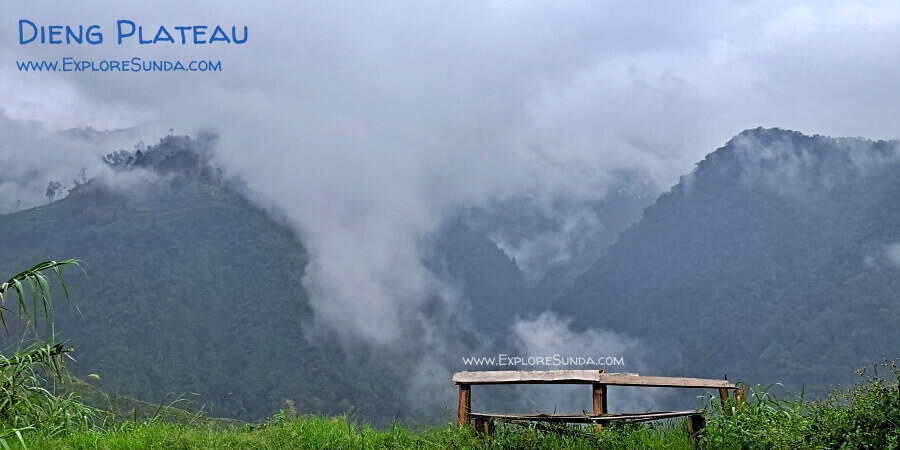- Sunda
- Dieng Plateau
- Legends from Dieng
Three Famous Legends from Dieng Plateau
The beauty of the Dieng Plateau attracts many visitors who come to enjoy its breathtaking golden sunrises, ancient Hindu temples, bubbling craters, tranquil lakes, and cool climate. The mist that frequently blankets this highland enhances the mystical atmosphere, giving rise to numerous local legends. Three of them are:
1. The Legend of Kawah Sikidang
2. The Legend of Kawah Sileri
3. The Legend of Batu Pandang Ratapan Angin.
 The breathtaking view of sunrise in Dieng Plateau.
The breathtaking view of sunrise in Dieng Plateau.First tale from Dieng Plateau: the legend of Kawah Sikidang
Sikidang Crater is one of the many craters that emit bubbling sulfur gases on the Dieng Plateau. It is the most famous due to the movement of its main crater, it keeps changing places where it releases gases that resemble a deer jumping around.
This phenomenon has woven itself into local folklore, particularly the tale of Prince Kidang Garungan. Kidang is a Javanese word for a deer. The prince’s unique identity comes not from an affinity for these graceful creatures but from a most unusual fate—he was said to possess the head of a deer!
The legend began with the tale of a stunning maiden named Shinta Dewi who captured the hearts of many suitors. Despite the persistent proposals, none could win her over due to her exorbitant dowry demands. Shinta’s beauty was legendary, drawing admiration from far and wide until it finally reached the ears of the affluent Prince Kidang Garungan.
Infatuated, the prince dispatched an envoy laden with priceless treasures to secure Shinta’s hand in marriage. When she witnessed the lavish gifts, Shinta eagerly accepted his proposal, believing that a wealthy prince must undoubtedly be handsome as well.
However, her heart sank when she laid eyes on him. Given no choice but to proceed with the wedding, Shinta Dewi set one condition: the prince must dig a well to provide clean water for her people and complete the task in a single day.
With his supernatural abilities, Prince Kidang effortlessly dug a deep, expansive well. But as he toiled below, fear gripped Shinta Dewi. She rallied her people, urging them to bury the prince with stones and dirt, sealing his fate as he worked.
As the earth covered him, Prince Kidang cursed those who’d doomed him. From that tragic moment, smoke began to rise, transforming the land into the mysterious Sikidang Crater we know today.
Second tale from Dieng Plateau: the legend of Kawah Sileri
Kawah Sileri is the deadliest crater in the Dieng Plateau. Its phreatic eruption in 1964 destroyed an entire village. The word "Leri" is Javanese for the whitish water resulting from rinsing rice, which resembles the color of the water flowing from the crater to the Dolog River. The crater's whitish appearance and dangerous eruptions have given rise to folklore about an evil witch.
According to the legend, once upon a time, in the heart of Pekasiran Village, an ancient witch reigned with an iron fist, accompanied by her headstrong apprentice, Dewi Mala. Known throughout the land for her fiery temper, the witch's wrath reached new heights when Dewi Mala dared to defy her, resulting in a tragic curse that transformed her into an unyielding stone.
One fateful day, the witch set her sights on conquering the neighboring Pagar Kandang Village. The courageous villagers banded together, fiercely resisting her sinister plans and ultimately driving her away. Enraged by their rebellion, the witch stormed back to her lair, determined to unleash her wrath. Armed with a coconut shell brimming with cursed leri (the remnants of rice washing), this enchanted liquid would obliterate everything in its path.
As she rushed forward, blinded by fury, her foot struck a stone: the encased form of Dewi Mala. Falling to the ground, the witch lost her grip, and the mystical water spilled everywhere. To everyone’s astonishment, the once-dreaded water transformed into the magnificent but dangerous Sileri Crater, forever altering the landscape and marking the end of the witch's reign of terror.
Third tale from Dieng Plateau: the legend of Batu Pandang Ratapan Angin
Batu Pandang Ratapan Angin is a lookout point featuring two boulders atop a hill. One boulder stands upright, while the other lies flat on the ground. From this vantage point, visitors can enjoy a breathtaking view of Telaga Warna and Telaga Pengilon.
In English, Batu Pandang Ratapan Angin translates to "the lookout of weeping stones," where people often hear sorrowful sounds as the wind blows. The positioning of the boulders and the sound created when the wind rushes through them have inspired folklore about heartache and regrets.
Legend has it that centuries ago, this land was ruled by a noble princely couple. However, their reign was marred by betrayal and heartache. It is said that the husband discovered his beloved wife's unfaithfulness. Confronted with anguish and fury, a dramatic confrontation ensued. The lover attempted to slay the husband, igniting a fierce and tumultuous battle.
In the harrowing climax of the conflict, the husband, in a fit of righteous anger, pronounced a curse upon his unfaithful wife and her illicit paramour. The earth took heed of his words, and the doomed pair was transformed into the colossal boulders that now stand as silent witnesses to their tragic fate. The wife, frozen in eternal penance, remains as the kneeling boulder, her sorrowful lament carried on the wind through the ages, a perpetual echo of regret for her grievous transgression.
To this day, the windswept hill continues to bear witness to this heartrending tale of love, betrayal, and retribution, drawing visitors who seek to witness the poignant legacy of Batu Pandang Ratapan Angin.
 Rest Area Tol Kayangan in the Dieng Plateau is often enveloped with mist.
Rest Area Tol Kayangan in the Dieng Plateau is often enveloped with mist.Recent Articles
-
Roro Jonggrang: A Tale Etched in the Stones of Prambanan Temple
Nov 05, 25 11:52 PM
Unravel the ancient Javanese legend of Roro Jonggrang that bridges myth, devotion, and the grandeur of Prambanan. -
Discover the Vibrant Celebration of Imlek in Indonesia!
Jan 13, 25 03:24 AM
The Chinese New Year of 2576 will be celebrated on January 29, 2025. Discover the special things in this Imlek festival! -
The Site Map of ExploreSunda.com
Nov 26, 24 10:40 PM
A thorough site map to help you browse through the Explore Sunda site.






